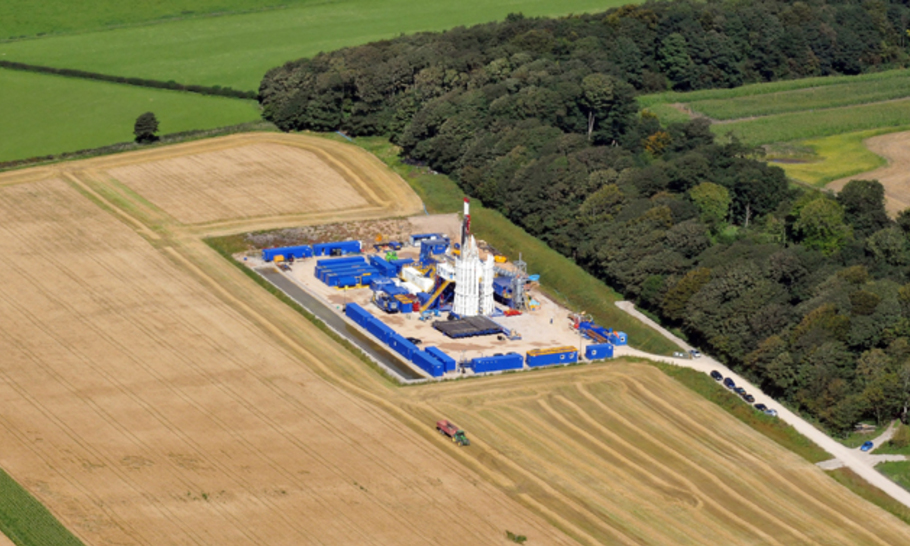To reduce emissions while keeping the lights on, we don’t need to nationalise energy. Just get fracking

Preese Hall fracking site. Pic courtesy: Cuadrilla Resources
Anyone alarmed by the Labour Party’s emerging energy policy should reflect that the dirigiste anti-free market measures announced last week don’t really go too far beyond where the Tory government’s policies have been for the last nine years. Conservative ministers like to pay lip service to free energy markets — one of the genuine industrial successes of the Thatcher and Major governments — but they show little sign that they understand how they work. And their instincts are to intervene, usually clumsily.
Yes, our politicians, in or out of power, informed or ignorant, have to respond to popular demands for action to mitigate climate change. But just as they don’t understand what their predecessors achieved with energy markets, they don’t seem to understand the remarkable success that Britain has achieved in reducing CO2 emissions over the past quarter of a century — largely by replacing coal with gas. But then neither do the militant environmentalists recognise these achievements. And our politicians, with a few honourable exceptions, are not prepared to debate the issues.
Indeed, the arrival in London of Greta Thunberg — a 16-year-old Swede on the autistic spectrum, who has been traumatised by climate scare stories that are largely unchallenged in the western media — was treated by the political class as something between a state visit and a pilgrimage by Joan of Arc. The related Extinction Rebellion blockades of central London, and the Thunberg-inspired school “strikes”, have been allowed to run their courses with little government opposition. The Metropolitan Police indulged them, saying that people had to be allowed to protest, and the Environment Secretary Michael Gove posed (awkwardly, it’s true) with Miss Thunberg and the Green Party MP Caroline Lucas.
Labour says it will take National Grid plc and local grid operators back into state ownership at a fraction of their market worth. The unimpressive shadow business secretary Rebecca Long-Bailey is unable to provide a number. National Grid and its Scottish equivalent SSE are currently valued on the stock market at a combined £38 billion. The regulatory value of the 14 local distribution companies is assessed by Ofgem at a further £24 billion. Labour justifies this by claiming that these companies, valued at a total £62 billion, have benefited from subsidies and asset-stripping, while paying out huge dividends. They have chosen the wrong target. The grid companies are the neutral common carriers that transport gas and electricity on behalf of dozens of competing energy supply companies. They are closely regulated and have been working hard in recent years to expand their networks to carry renewable electricity from the main wind power centres in Scotland and offshore.
The companies and investors who have benefited from climate largesse are the renewable power generators — to the tune of some £30 billion over the past 20 years. These subsidies began under Labour and were continued enthusiastically under the Coalition and subsequent Tory administrations. The subsidies do not come from central government funds; the costs are passed on to consumers through their bills. They have resulted in a huge increase in wind generation capacity, but they also lay the Tories and the energy companies open to Corbynite accusations of crony capitalism. If a future Labour government were to follow the logic of its recent announcement and renationalise the generators, as well as the grid companies, the total bill could be anything up to £150 billion. And, in the long run, there would be further huge economic costs arising from the inevitable inefficiencies of a publicly-owned monopoly.
While Tory energy and climate policies are not quite as catastrophic as Labour’s, they are hardly champions of free markets and low costs. An egregious example is the Hinkley Point C nuclear power plant, currently under construction but many years behind schedule. The protracted “negotiations” between the Cameron government and the operator EDF provide an object lesson in how not to expand nuclear — or any other — type of power generation.
There was no competition to provide the plant, and the deal was settled by agreeing a ruinously high “strike price” for the electricity eventually generated. The price agreed in 2013 was £92.50 per megawatt hour, indexed to inflation. The plant is unlikely to generate any power before 2027, by which time the strike price, indexed at an assumed 2.5% annual inflation, will be more than £130/MWh. The current wholesale price of electricity is £41/MWh. The strike price is guaranteed to EDF. If the wholesale market price is less than the strike price, EDF is compensated for the difference, the amount being charged to customers’ bills. This is really a very bad deal.
If Corbyn’s Labour Party achieves power, the outlook for the British energy industry is dire, though admittedly that would be just one part of the economic disaster that would ensue. If the Tories cling on past the next election, due in 2022, there are things they could to mitigate the climate effects of energy while keeping the lights on.
They could reopen negotiations with other nuclear generators, this time ensuring proper competition for the attractive opportunity to supply long-term electricity to one of the most developed markets in the world. They should also recognise that renewable electricity needs to be reliably backed up, and that until battery technology has made some enormous leaps, the only solution is natural gas. And rather than relying, as we increasingly do, on imports from Qatar, Russia and the US, the government could encourage — rather than discourage, as they do at present — development of the probably huge shale gas resources in the north of England. Supply security, improved balance of payments, tens of thousands of skilled industrial jobs: what’s not to like?





